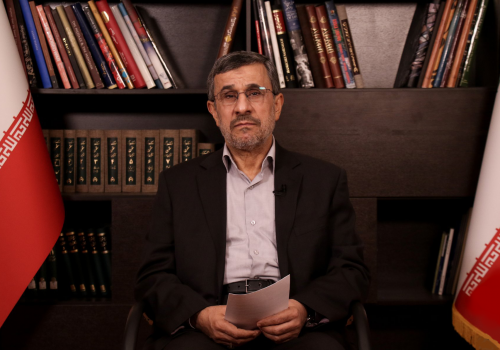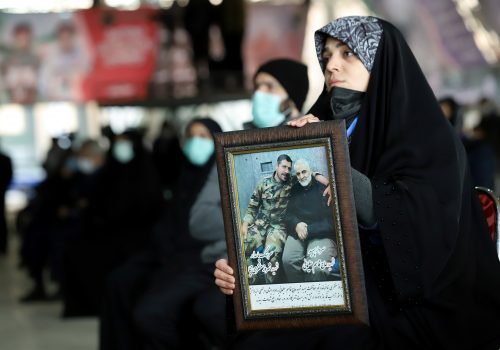This Iranian pop song is “more dangerous than polio”
Sasy Mankan is an Iranian pop singer who knows what his fans want.
When the music video teaser of Tehran Tokyo dropped on March 1, it featured a cameo with American porn star Alexis Texas, arguably one of the most popular adult film actresses in Iran—a country where pornography often carries the death penalty and is banned on digital platforms, though people are still able to get around through illegal downloads via VPNs.
Tehran Tokyo is quickly turning into the California-based Mankan’s biggest hit. Since being posted online, the Instagram teaser video now has over eighteen million views and has received a record-setting 4.5 million plays on Persian language music website Radio Javan within forty-eight hours. Iranian officials typically view Tehrangeles pop music like Mankan’s as part of a Western cultural invasion or “soft war” to subvert the Islamic Republic. However, in this particular case Iranian authorities and conservatives alike are expressing outrage at the “pornographic” content of the video—despite it having no pornography.
This isn’t the first time Mankan’s music has pissed off Iranian officials. In 2019, his hit Gentleman inspired what Education Minister Mohammad Bathaei described as “disturbing videos” of dancing students of all ages across the country, with teachers and adults sometimes joining in on the fun. While dancing isn’t illegal, Iran’s Islamic Penal Code is vague about what constitutes “acts against morality,” which is why there are countless reports of Iranians arrested just for dancing.
Recognizing he had another viral hit, in a now deleted Instagram post, Mankan invited Iranians to send in their videos for the “Somayeh Challenge,” the name of the female protagonist in “Life and a Day”—an internationally acclaimed Iranian drama from 2016—which is repeatedly mentioned in the lyrics (Mankan and Texas, briefly dressed as the characters, reenact a famous scene from the film).
Just days after the teaser was released, Iranians began publicly posting a mix of Dubsmash—lip-synced videos combined with dubbed audio—and sing-alongs to the hit, with Mankan even reposting dozens of versions on his Instagram stories along with a video compilation post. Then, on March 10, the date of the music video release, Tehran’s Guidance Court threatened that the judiciary would take legal action against him in an international court if Mankan posted the video. It was reportedly done “in response to the widespread demands and concerns of the honorable Iranian people.”
Iranian authorities also said that they would prosecute anyone sending Dubsmash videos. On the same day, news emerged that Iranian authorities had arrested two brothers for allegedly co-producing the teaser and music video with Mankan. None of the threats deterred the singer. The music video was still dropped on its release date.
But how did it get to this point? In the days following the release of the Tehran Tokyo teaser, Iranian politicians and conservatives called for the video to be censored because they claimed that it presented pornography to children. The head of Islamic Republic of Iran Broadcasting (IRIB) Kids TV channel, Mohammad Sarshar, tweeted on March 2: “Showing pornography to children is banned all over the world and anyone encouraging children to watch pornography will face a negative reaction by peoples and governments.”
Iran’s Audio-Visual Media Regulatory Body issued a statement calling Tehran Tokyo an “outright violation of child protection guidelines.” Journalist Emily Amraee tweeted, “I tremble when I imagine that children might learn [Texas] is a porn star and search for her name,” adding that the video was “more dangerous than polio.”
Some Iranians blamed Information and Communications Technology Minister Mohammad Javad Azari Jahromi for pushing back on blocking Instagram, one of the most popular social media apps not filtered in the country, which has recently been a source of contention between him and hardliners. Ironically, Jahromi played a role in shutting down the Internet during the November 2019 protests in which security forces killed at least three hundred protesters and arrested thousands.
Using the hashtag #Sasy_Jahromi, the minister’s critics—who believe he may run as a moderate candidate in June’s presidential election—used the Tehran Tokyo video as an excuse to criticize his handling of cyberspace. One user accused Jahromi of creating a “space in which pornography is rampant” adding, “is this really that government of prudence and hope,” referring slyly to the campaign slogan of the Hassan Rouhani administration. Another user posted a photo of Jahromi with his children along with the caption: “When you played with… the future of the teenagers and children of your country by keeping the atmosphere open for promoting prostitution and vulgarity, did you think of your own children???”
Taking note of the outrage, parliamentarian Mojtaba Tavangar stepped in to offer to help resolve the issue.
As the debate continued online and in public, some Iranians took the time to leave humorous comments on Texas’ verified Instagram account in English and Persian. Many referred to her as “Somayeh.”
Surprisingly, Mankan isn’t the first to cast an adult film star in a Tehrangeles pop video. Sweden-based singer Arash featured Aylar Lie, an Iranian-Norwegian porn star-turned-model, in two of his music videos during 2010 and 2012.
According to US-based child rights activist, Hamed Farmand Mankan’s music video “does not violate children’s rights, and that education is the responsibility of parents.” What he does consider a violation of children’s rights in the reposting of Dubsmash videos featuring children.
It’s worth noting that Iran neither uses the concept of age appropriate content nor television ratings. State media regularly airs graphic footage from warzones and even had a series that told the story of 13-year-old Mohammad Hossein Fahmideh, who “martyred” himself during the Iran-Iraq war by detonating a grenade under an Iraqi tank to save his comrades. Essentially, there is no problem with violence on television. It’s “immorality,” or pornographic film actresses, that becomes the red line.
Reading some of the Persian language commentary online about the provocative Tehran Tokyo video, one cannot help but notice the parallels with how some American conservatives reacted when rapper Cardi B and Megan Thee Stallion’s WAP dropped in August 2020. Cultural conservatives have a lot in common no matter where they come from or live.
Holly Dagres is editor of the Atlantic Council’s IranSource blog, and a nonresident senior fellow with the Middle East Programs. She also curates The Iranist newsletter. Follow her on Twitter: @hdagres.
Image: An Iranian pop singer, Sasan Yafteh, better known by his stage name, Sasy, prepares for the stage at the Maraya Concert Hall during Tantora festival, in al-Ula, Saudi Arabia March 6, 2020. Picture taken March 6, 2020. REUTERS/Ahmed Yosri


